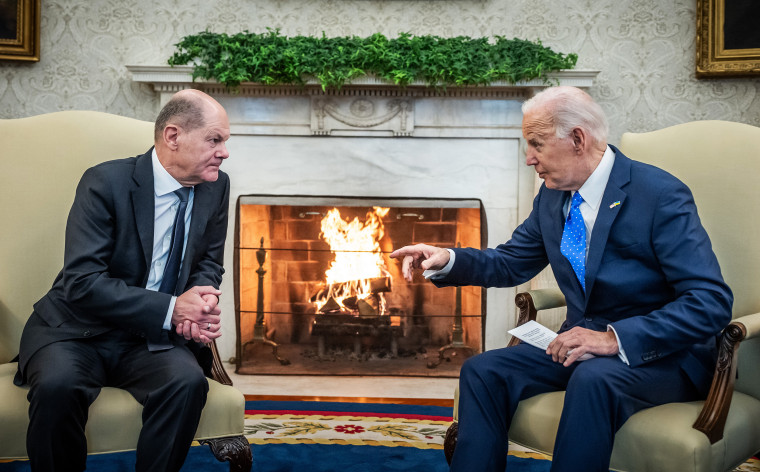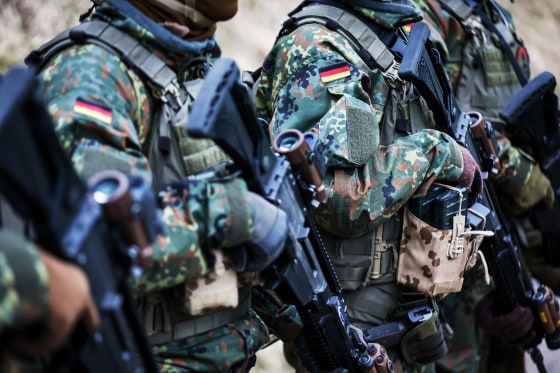LONDON — The call came from inside the Western alliance.
Deepening fears that the Kremlin may be succeeding in its effort to sow discord between the U.S. and its allies, Russia has published the audio of a private discussion among high-ranking German military officers. The leak has caused uproar in Berlin, possible harm to its support for Ukraine and accusations that this is all part of Russian President Vladimir Putin’s yearslong “information war” against the West.
Germany on Monday dismissed the Kremlin’s claims that the recording — which included discussions of how Ukraine might use German weapons against Russian forces and potential strikes by Kyiv on a key bridge in occupied Crimea — betrayed plans to go to war directly with Russia.
Berlin has not denied the authenticity of the leaked call, instead promising a quick investigation into how such a high-level conversation was apparently intercepted by Moscow.
It’s the latest sign that Putin is exploiting divisions within NATO as the transatlantic alliance grapples with the prospect of a second Trump presidency and waning support for Ukraine.
“Another word for information war is propaganda,” said Frank Ledwidge, a former British military intelligence officer and senior lecturer in war studies at England’s University of Portsmouth. “This was a major foul-up, and the Russians are taking advantage of it.”
‘Undermining our unity’
The 38-minute audio recording was leaked Friday by a leading Russian propagandist, just as the eyes of the West were on the funeral of opposition leader Alexei Navalny in Moscow.
Margarita Simonyan, head of Russia’s state-run RT network, published the audio of the call, which she said features officers including the head of Germany’s air force talking about the use of Taurus long-range cruise missiles, and potential strikes against the Kerch Bridge, Putin’s pet project connecting the annexed Crimean Peninsula to Russia.
The use of the German-made missiles could require the presence of German troops on the ground to help deploy them, the officers reportedly said, a red line that Berlin has been wary of crossing.
Germany is now the second-biggest supplier of military aid to Ukraine after the U.S., but has drawn growing criticism for its reluctance to grant Kyiv’s wish for supplies of longer-range weapons like the Taurus, which would help Ukraine strike deeper inside Russian territory. German Chancellor Olaf Scholz reiterated his opposition to supplying the weapons last week, citing a desire to avoid being drawn directly into the conflict.
But the Kremlin quickly accused Germany of planning just that as it seized on the revelations with glee.
Spokesman Dmitry Peskov said Monday that the leak was proof that “plans to launch strikes on Russian territory are being substantively and specifically discussed” within the German army. It shows, he said, the “direct involvement” of the West in the war in Ukraine — part of the Kremlin’s long-standing narrative framing the invasion of its neighbor as an existential fight for Russia’s survival.
Russian state media reported that Germany’s ambassador had been summoned by the Russian Foreign Ministry, although Berlin said it was a preplanned meeting.
A spokesperson for the German government, Wolfgang Buechner, said that any suggestions that the country was preparing to enter a war with Russia were “absurd, malicious Russian propaganda.”
The leak was “part of an information war that Putin is waging,” German Defense Minister Boris Pistorius said Sunday. “It is a hybrid attack aimed at disinformation. It’s about division, it’s about undermining our unity.”

There was little immediate public response from allies.
Tobias Ellwood, a British lawmaker and former chair of the defense committee in Parliament, told the BBC that the leak was “worrying on a number of levels.” Prime Minister Rishi Sunak’s office told reporters that it was for Germany to investigate, noting that the United Kingdom was the first country to give Ukraine long-range precision missiles “and we would encourage our allies to do the same.”
It’s an embarrassing episode for Germany, which has long been vulnerable to Russian espionage and disinformation campaigns.
The German Defense Ministry said Monday that the probe into the incident would look into whether the host for the conversation, the publicly available WebEx conference platform, was appropriate for such a high-level discussion.
That an insecure platform would be used to discuss military operations in Ukraine betrays a sense of naivete by the Germans, Ledwidge said.
“It demonstrates complacency and lack of basic security competence,” he added.
The incident is the latest sign of discord in Europe over how best to counter the Kremlin and support Kyiv.
French President Emmanuel Macron raised eyebrows last week when he said that putting Western troops on the ground in Ukraine was not “ruled out” in the future. The U.S. and key European allies, including Germany, quickly distanced themselves from Macron’s comments, which Putin cited days later in his latest warning of nuclear war. Those divisions are exacerbating the consequences of stalled U.S. military aid, as Ukraine struggles with shortages of ammunition and manpower that are helping Russian forces to advance.
NATO sought to demonstrate unity Monday as it kicked off military drills involving more than 20,000 soldiers along its expanded Nordic frontier.
But in a hint of challenges ahead, the leader of NATO member Hungary announced Sunday that he will meet with former president and GOP front-runner Donald Trump in Florida this week. Both Viktor Orbán and Trump have raised the ire of European leaders with recent actions seen as favorable to Putin and damaging to the Western alliance.
European leaders such as Macron and Orban have different agendas and priorities, mostly driven by the pressures they face internally, Ledwidge said, and the leaked call will only add to public signs of Western unease over how to oppose Russia.
“It makes Moscow’s propaganda task easier,” he added.

